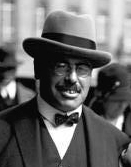
Back رودلف هيلفردنج Arabic رودلف هيلفردنج ARZ Rudolf Hilferdinq Azerbaijani Rudolf Hilferding Catalan Rudolf Hilferding Czech Rudolf Hilferding Welsh Rudolf Hilferding German Rudolf Hilferding Esperanto Rudolf Hilferding Spanish رودلف هیلفردینگ Persian
Rudolf Hilferding | |
|---|---|
 Hilferding in 1928 | |
| Minister of Finance (Weimar Republic) | |
| In office 13 August 1923 – October 1923 | |
| Preceded by | Andreas Hermes |
| Succeeded by | Hans Luther |
| In office 29 June 1928 – 21 December 1929 | |
| Preceded by | Heinrich Köhler |
| Succeeded by | Paul Moldenhauer |
| Personal details | |
| Born | 10 August 1877 Leopoldstadt, Vienna, Austria-Hungary |
| Died | 11 February 1941 (aged 63) Paris, German-occupied France |
| Political party | Social Democratic Party of Germany |
| Alma mater | University of Vienna |
| Occupation | Politician |
| Part of a series on |
| Marxism |
|---|
 |
| Part of a series about |
| Imperialism studies |
|---|
 |
Rudolf Hilferding (10 August 1877 – 11 February 1941) was an Austrian-born Marxist economist, socialist theorist,[1] politician and the chief theoretician[2] for the Social Democratic Party of Germany (SPD) during the Weimar Republic,[3] being almost universally recognized as the SPD's foremost theoretician of the twentieth century.[4] He was also a physician.[4]
He was born in Vienna, where he received a doctorate having studied medicine. After becoming a leading journalist for the SPD,[3] he participated in the November Revolution in Germany and was Finance Minister of Germany in 1923 and from 1928 to 1929. In 1933 he fled into exile, living in Zurich and then Paris, where he died in custody of the Gestapo in 1941.[1][5]
Hilferding was a proponent of the "economic" reading of Karl Marx, identifying with the "Austro-Marxian" group.[6] He was the first to put forward the theory of organized capitalism.[7] He was the main defender of Marxism from critiques by Austrian School economist and fellow Vienna resident Eugen von Böhm-Bawerk. Hilferding also participated in the "Crises Debate" – disputing Marx's theory of the instability and eventual breakdown of capitalism on the basis that the concentration of capital is actually stabilizing. He edited leading publications such as Vorwärts, Die Freiheit, and Die Gesellschaft.[3] His most famous work was Das Finanzkapital (Finance capital), one of the most influential and original contributions to Marxist economics[4] with substantial influence on Marxist writers such as Vladimir Lenin[7] and Nikolai Bukharin influencing his writings on imperialism.[2][8]
- ^ a b International Institute of Social History, Rodolf Hilferding Papers. http://www.iisg.nl/archives/en/files/h/10751012.php
- ^ a b Wistrich, Robert Solomon (2002). Who's who in Nazi Germany. Psychology Press. pp. 110–11. ISBN 978-0-415-26038-1.
- ^ a b c Smaldone, William, Rudolf Hilferding and the total state., 1994. http://www.encyclopedia.com/doc/1G1-15867926.html
- ^ a b c Barclay, David E.; Weitz, Eric D. (1998). Between Reform and Revolution: German Socialism and Communism from 1840 to 1990. Berghahn Books. ISBN 978-1-57181-120-2.
- ^ German Resistance Memorial Center. http://www.gdw-berlin.de/bio/ausgabe_mit-e.php?id=244
- ^ The New School. http://cepa.newschool.edu/het/profiles/hilferd.htm Archived 25 September 2007 at the Wayback Machine
- ^ a b Lane, A. T. (1 December 1995). Biographical Dictionary of European Labor Leaders. Greenwood Publishing Group. ISBN 9780313264566.
- ^ Fischer, Ruth (2006). Stalin and German Communism: A Study in the Origins of the State Party. Transaction Books. ISBN 978-0-87855-822-3.
© MMXXIII Rich X Search. We shall prevail. All rights reserved. Rich X Search